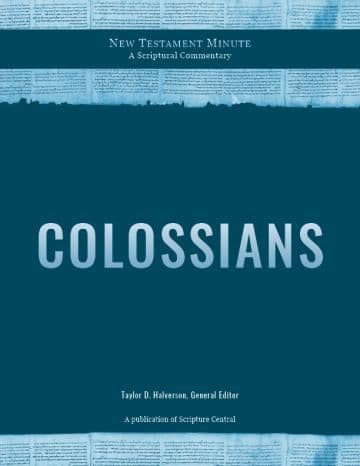Book
3 Chapters

Of course, it was Jesus who taught His disciples the enduring value of prayer. To their request, “teach us to pray,” He responded with both the Lord’s Prayer and with a story about two friends, one of whom was in a desperate need to provide food for a third person who had arrived in the middle of the night and needed a meal. The reason that the fellow, already in bed, got up and helped the pleading neighbor was his importunity. Simply stated, the petitioner did not stop pleading for help (Luke 11:1–8). This sense always lies behind Paul’s encouragement that his readers pray. This time, he makes clear that prayer is to be accompanied by thanksgiving, the key that unlocks the sweetest and most enduring blessings. We need only think of what Jesus gave to the one leper in ten who returned to give thanks for his cleansing: “Your faith has saved you” (Luke 17:19 Jerusalem Bible).
For many modern believers, the most nettlesome piece of Paul’s instructions has to do with his first words to married women: “Wives, submit yourselves unto your husbands.” As if this were not enough, he then wrote, “As it is fit in the Lord”—that is to say, this is how the Lord wants it. Is this the last word on this topic? Likely not, because Paul writes much more about this topic in his letter to the Ephesians, laying a heavy burden on husbands to love their wives just “as Christ also loved the church, and gave himself for it” (Ephesians 5:22–33, especially 5:25). Elsewhere in his letters Paul affirms, perhaps more evenly, that “neither is the man without the woman, neither the woman without the man, in the Lord.”[fn]1 Corinthians 11:11; S. Kent Brown, The Epistle to the Ephesians (Provo, UT: BYU Studies, 2023), 468–480.[/fn] According to the Apostle’s language in Ephesians, all Church members were to submit themselves “one to another in the Lord,” setting out the context for his words about wives (Ephesians 5:21).
The rest of his instructions to those in homes are straightforward except for his words directed to masters of slaves. Whether Paul ever envisioned a Christian slave as a branch president and a slave master as his counselor we shall never know. But the world of the Church was to be different from the Roman world, in which the mistreatment of slaves was common. How so? Because Christian masters were to “give unto your servants that which is just and equal.” In another place, the Apostle wrote that masters were not even to threaten their slaves (Ephesians 6:9). There was a good reason for this. Masters were not the final answer about how their servants fared in this life. For “ye also have a Master in heaven” who pays loving attention to slaves and those on society’s margins.[fn]Colossians 4:1; Exodus 21:20; also Exodus 22:21–24; Deuteronomy 10:17–19; Luke 7:2–10, 11–17; Hebrews 10:30–31.[/fn]
Before Paul turns to his beloved coworkers, he swings attention toward the hoped-for results of prayer. Paul is imprisoned, “in bonds,” and he earnestly desires “that God would open unto us [missionaries] a door of utterance” (Colossians 4:3). From such language, we see how strong his feelings were about sharing the message of the gospel. It must have been like it was for Jeremiah, “a burning fire shut up in my bones” that was never extinguished (Jeremiah 20:9). When finally freed, he would follow his own advice to readers: “Let your conversation be always full of grace” (Colossians 4:6 New International Version). There was no room in the Church or out of it for harsh words.
All the names of those whom Paul now mentions as faithful companions appear elsewhere in the New Testament, except “Jesus, which is called Justus” (4:11). Notable here are two authors of Gospels, Mark and Luke (4:10, 14). Several of Paul’s fellows are mentioned in the epistle to Philemon, tying Colossians and Philemon together as written at the same time. Aristarchus, a Macedonian, comes in for special notice because he was present with Paul at the riot in Ephesus, in Paul’s preaching efforts in Greece, and on the ship driven by a fierce storm onto the shore of Malta.[fn]Acts 19:29; 20:4; 27:2.[/fn] Doubtless the Apostle was grateful to have these loyal servants of the Lord as his fellow missionaries.
The following is adapted from S. Kent Brown, The Epistle to the Colossians (Provo, UT: BYU Studies, forthcoming).
Items in the BMC Archive are made publicly available for non-commercial, private use. Inclusion within the BMC Archive does not imply endorsement. Items do not represent the official views of The Church of Jesus Christ of Latter-day Saints or of Book of Mormon Central.